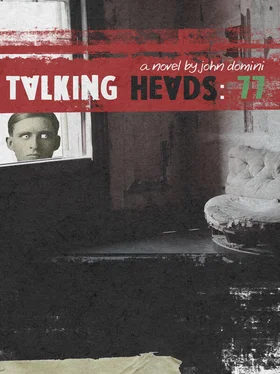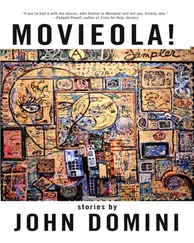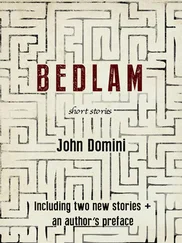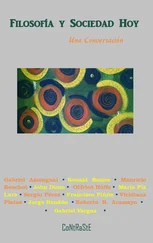John Domini - Talking Heads - 77
Здесь есть возможность читать онлайн «John Domini - Talking Heads - 77» весь текст электронной книги совершенно бесплатно (целиком полную версию без сокращений). В некоторых случаях можно слушать аудио, скачать через торрент в формате fb2 и присутствует краткое содержание. Год выпуска: 2015, Издательство: Dzanc Books, Жанр: Современная проза, на английском языке. Описание произведения, (предисловие) а так же отзывы посетителей доступны на портале библиотеки ЛибКат.
- Название:Talking Heads: 77
- Автор:
- Издательство:Dzanc Books
- Жанр:
- Год:2015
- ISBN:нет данных
- Рейтинг книги:4 / 5. Голосов: 1
-
Избранное:Добавить в избранное
- Отзывы:
-
Ваша оценка:
- 80
- 1
- 2
- 3
- 4
- 5
Talking Heads: 77: краткое содержание, описание и аннотация
Предлагаем к чтению аннотацию, описание, краткое содержание или предисловие (зависит от того, что написал сам автор книги «Talking Heads: 77»). Если вы не нашли необходимую информацию о книге — напишите в комментариях, мы постараемся отыскать её.
Talking Heads: 77 — читать онлайн бесплатно полную книгу (весь текст) целиком
Ниже представлен текст книги, разбитый по страницам. Система сохранения места последней прочитанной страницы, позволяет с удобством читать онлайн бесплатно книгу «Talking Heads: 77», без необходимости каждый раз заново искать на чём Вы остановились. Поставьте закладку, и сможете в любой момент перейти на страницу, на которой закончили чтение.
Интервал:
Закладка:
“Just tell them,” Garrison repeated.
He turned his back again, before Kit could respond. Hunched over his notes, his gorge bubbled with coffee. He’d needed a third cup.
“Better catch up, sweet butt.” A single voice, quiet. When had the ruckus died down?
“Don’t want to be left all a-lone, sweet sweet.”
The penitentiary had five levels, “E” at the bottom and “A” at the top. The entry from outside was at the central level. The heat increased as they descended, until Kit felt his ribcage running sweat. He’d wondered about wearing his trenchcoat. Most of the way there were only a couple oversized bulbs for each corridor, the light made hotter by its steel reflecting cone. The cellblocks here were empty except for the occasional white stare. Even in the pen it was a weekday morning. There was the workshop, the law library, classes. No doubt some aired their resentments in the cold yard.
Kit had seen the blueprints. He’d visited county jails, and by now he must have interviewed a couple dozen cons. He could even recall Monsod’s optimum population, 1,118. He decided to figure out what proportion of the prisoners were where. Start with those in these corridors, a ballpark figure anyway. How many had he seen so far? Okay, now subtract that from — well, there were the cutbacks, the overcrowding. Make the total population more like 1500, a nice round figure. No need to make himself crazy. So, the workshop, the yard, the library … classes and group therapy … altogether make it eight possible locations for any prisoner, with the largest percentage per capita on a Thursday morning either in the shop or in the yard: say 300 “working,” 300 “playing.” No doubt a time-&-motion expert could break it down further.
In the center of “D” level, an otherwise blank corridor, stood the doors to the workshop. Here the heat was worst. The inmates worked stamping license plates, and the fumes of paint and molten metal made Kit’s eyes water. But the windows showed him nothing. Scarred and dented plexiglass, portholes on fog.
Okay, my basement boys and girls — how can you tell a tourist? C’mon, punks — how do you know a poser when you see one? I mean, you and me, we belong down in those dungeons. When we feel those club walls tremble with the bass guitar, we know what they’re saying, we read it easy as a blind man reads Braille. Right! We wouldn’t even be reading this kind of newspaper, this proud alternative press, if we didn’t belong down there.
But a tourist, a fly-by, a fake — how can you tell one when you see one?
*
Aw, Viddich. Stay with it. Below “D” level, Kit and the others entered an enclosed spiral stairwell. For the first time he got between the two inspectors. There, almost between one ringing step and the next, it was January again. January and nighttime: down here they left the lights out. Kit’s eyes were still adjusting when the four of them stopped.
“Wow.” The inspector who spoke was so close that Kit could feel the man shiver. “You can’t even use forced air?”
“Somebody had the bright idea of using the workshop ovens as the furnace.” The guard tapped his baton across the downstairs door to find the lockbox. “Right now the overhead pipes are so bad we can’t get any circulation.”
“Ah, Charley …” The inspector’s voice had changed. “Overhead pipes?”
“Charley,” the other inspector said, “we never heard about no overhead pipes.”
This guy too sounded off-key, forced. Kit wondered about the stairwell’s echo, and when the door opened, the group hustled through faster than necessary. Was there something worth knowing about overhead pipes? Kit tried to make a note in the dark, but a new dampness made his lungs catch. The smell was a thousand miles out of place, the skunk-cabbage chill of his uncles’ creekbed. When the fluorescents came on overhead, coffee pulsed under his scalp.
“What is this?” he said. “What are you so scared of?”
The inspectors had slipped past him. As he blinked and focussed, Kit could see they had no time for him anyway. The room looked wrecked, uninhabitable. Down here the cells weren’t lined up in rows like on the upper levels, and the doors didn’t have openings. Instead the place was arranged like a suite of offices around a vacant, phlegmy lounge. The offices were bolted top and bottom, and the floor had no rug. Standing water stretched across the room, maybe a yard shy of wall to wall. It was green with institutional paint.
On the unrippled surface of the pool, the lights’ reflection — the fluorescent strip, the tin crosshatching — suggested the ribbed back of a crocodile. One of the inspectors knelt beside the pool and, another surprise, he could dip his finger only to the second knuckle. But then, Kit reminded himself, Junior Rebes couldn’t have tested the depth. Chances were that Junior hadn’t even seen how far the green scuzz rose up the walls. Over the frame round the exit, flakes of paint lifted off the steel like lichen. The smell was fungous and rust trailed in stripes down from the bolts.
The only sounds were the movements of the inspectors and a rhythmic babble from inside one of the cells. A chant, punctuated by handclaps.
Kit went back to his pad: “?overhead pipes?” Then, okay, six cell doors on the floor plan. One, two, three, four, five and six. Doors not quite tall enough for him to enter without bending, with sliding panels at nipple height. Plus a seventh: shorter still and without a food slot, placed so its ceiling must be sawed off by the spiral stairs. God, was that the closet? The so-called utility closet? Angled against the door stood an ordinary police lock, the bar and hook cleaner, newer metal than the door itself.
Garrison spoke up: “We’re not scared of anything.”
Kit touched his neck. It took a moment to recall his question.
“I mean,” Garrison said, “there are lights in each of the cells. Lights and a space heater. The animals we got down here don’t need no more than that.”
“What about the stairwell, then?” Kit asked.
“The seepage musta got to the wiring already.” This was the inspector testing the water. “Wouldn’t you say so, Ad?”
“Looks that way,” Ad said. Neither of them glanced at Kit.
“Seepage in the wiring,” Garrison said, “whoa. The electric chair, you know, that’s been outlawed in this state.”
The three men laughed. They were nowhere near each other, the inspectors on opposite sides of the puddle, the guard across the room. But their echoes linked up over the water and, laughing, they became a single unit. A bloc. Kit kept frowning, thinking about the state payroll. These inspectors must have been just as scared and he was, but for them, the guard’s one-liner was a reassurance, a union card. A reminder that even in Monsod, you didn’t make waves. You didn’t ruffle the surface of pay grade and job title. A “corrections officer” like Garrison, if he started young enough and stayed with it, could retire at forty-five. A “maintenance engineer” like Ad — now nervously fingering hair over his bald spot — was a construction man who’d lucked onto a desk job.
The men grew quiet. Their look settled on him. The chanting continued, the spacey clap, clap.
Kit bent to write, tucking his elbows.
*
He’d half-expected briefcases filled with instruments. Syringes, weights and measures, test tubes. But aside from the tool belt, all these men had with them were a box of zip-lock Baggies. The belt held only one tool of any size, a foot-long wrench with a head big enough to open pipe fittings. In the other large holster, the inspector kept a couple of half-pint bottles. Baby bottles, Kit guessed. One still bore the white fuzz of an old label. When the man scooped the puddle Kit imagined him drinking the scum. Meantime the other inspector used a jackknife to take scrapings from the walls.
Читать дальшеИнтервал:
Закладка:
Похожие книги на «Talking Heads: 77»
Представляем Вашему вниманию похожие книги на «Talking Heads: 77» списком для выбора. Мы отобрали схожую по названию и смыслу литературу в надежде предоставить читателям больше вариантов отыскать новые, интересные, ещё непрочитанные произведения.
Обсуждение, отзывы о книге «Talking Heads: 77» и просто собственные мнения читателей. Оставьте ваши комментарии, напишите, что Вы думаете о произведении, его смысле или главных героях. Укажите что конкретно понравилось, а что нет, и почему Вы так считаете.












